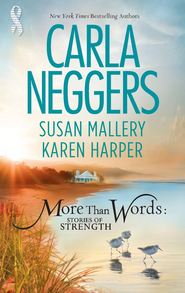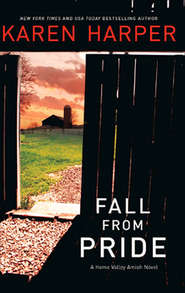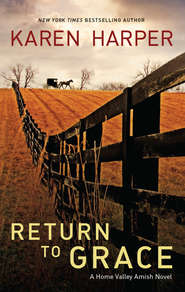По всем вопросам обращайтесь на: info@litportal.ru
(©) 2003-2024.
✖
Below The Surface
Настройки чтения
Размер шрифта
Высота строк
Поля
Ignoring the slashing rain and continued threat of lightning, he pulled her carefully up out of the slosh of the surf. Hunched over her, just beyond the breaking waves, he started mouth-to-mouth resuscitation. He hadn’t done that on anyone since he’d tried to save his father when he’d found him on the floor, and that was too late. What had happened to this woman? Surely she hadn’t been swimming in the storm.
She seemed slender and small, but he knew she was a vital, strong woman. Come on, baby. Come on back. Breathe for me. Let my lips warm yours, sweetheart. Come on, come on.
It had amused him, then impressed him, that two women would run such a rough-and-tumble business, especially when their competition across the bay was a gruff, tough guy who pretty much had a monopoly on search and salvage in the area. The women mostly did light salvage, none of the heavy stuff with dredging and demolition like Sam Travers, but search and salvage was always a risky business.
Come on, baby, I know you’re spunky. Take my breath. Come on, you beautiful little mermaid!
He started to panic, his sweat mingling with the rain, even in the cool rush of wind. After what seemed an eternity, her mouth moved against his. He stopped and looked down into her face, glazed by rain and gulf water. Her thick eyelashes, plastered to her ashen cheeks, flickered. She frowned and moaned.
“Hey, mermaid!” he said, feeling like a fool, but he couldn’t remember her last name and wasn’t sure which twin this was. Still, he used the name he knew, one he’d remembered for months now because it had seemed to suit her. It had reminded him of the word brio, for her enthusiasm and verve that time they’d talked and eaten together. He’d felt an instant attraction to her, a surge of desire that he’d tried to control by being overly polite and teasing that day. “Briana?” he said, his voice shaking. “Briana!”
She slitted her eyes open. “Daria?” she said, and started to cough up water.
He rolled her over slightly and braced her with one arm around her. One hand held her forehead steady like his mother used to do for him years ago when he threw up. It wasn’t until he saw the burn marks on her limp left wrist, like a big bracelet around her dive watch, that he realized she might have been hit by lightning. He laid her back down on the sand, leaning over her, trying to keep the rain and wind off her with his body.
“Where’s Daria?” he asked. “What happened?”
No answer. He gasped when he saw her eyes were dilated, the huge, black pupils eating up the gray-green of the irises, the color of the sea. He had to get her medical help—now. He couldn’t wait for the storm to end. But there was no way to get an EMS vehicle out here, and a medical chopper couldn’t fly in this mess. He could get on his radio and Mayday the coast guard, but it would take them time to get out here and he could have her into Naples by then—if all went well.
He had to hurry. His mermaid had evidently fainted or gone comatose at his feet.
He put his hand on her chest to be sure she was still breathing. Yes, shallow but steady. Though he hated to take the chance with the sloop, he had to risk sailing in with her right now. At least in an all-wooden boat—if he could get it off the beach—they might be able to escape the lightning. It would be rough going, but he had to try.
Praying she had no broken bones or internal injuries, he lifted her into the sloop and gently lashed her down. He stripped off his polo shirt and, though it was soaked, too, laid it over her upper torso. One of his customers had been hit by lightning on a golf course, and his doctor had told him that fast medical help had saved him from severe complications. He could not bear it if this beautiful, bold woman were permanently hurt. That old adage about being responsible for someone if you saved their life hit him hard, but he hadn’t saved her yet.
Straining every muscle in his body to get some lift for Streamin’, Cole tried to time pushing the sloop off the sand with the roll of the surf, but the power of the waves and wind beat it back. Waves could easily swamp or capsize a boat leaving a beach. His fourteen-foot sloop, which he knew more intimately than he knew any woman right now, fought him hard.
But he saw the wind had clocked around to the north. He could use the power of the sails to propel the sloop off the beach. In a hand-over-hand effort, he pulled the main halyard until the sail had reached the top of the mast. Then with a grunting, grinding heave, Cole pushed the bow of the boat off the beach toward the pounding surf. As the little sloop swung her bow through the wind, the sails filled, and she moved into deeper water. He pulled himself into the cockpit and grabbed the tiller in one hand while securing the mainsheet with the other. As he lowered the centerboard, the sloop began to feel her sea legs. She quickly picked up speed on a beam reach and cut through the water like a race car.
But it was brutal sailing. He had to step over his mermaid when he played the mainsheet and sit outboard to balance the heavy heeling. He feared a broach roll and had to adjust the tiller constantly. Every time the boat heeled, water sloshed over the side to soak Briana. She came to again, shoved her head and shoulder up by one elbow and screamed, “Sharks! Daria, sharks!”
“Lie down!” Cole shouted. “Down or the boom will get you when we tack. You’re with me, you’re all right. Lie down! There are no sharks. I won’t let them get you or Daria!”
That seemed to calm her, and that trust clenched at his heart. He had to get her to safety, see that she was taken care of. She was out of her head, and his friend had said amnesia and brain damage could be some of the aftereffects of a lightning strike. If he could just let go of the tiller and sit still a second in this raging chaos, he could call for help, have someone meet him at the marina with a squad for her. But he couldn’t tell where he was. To the pier yet? He didn’t want to hit the pier.
As for the sharks, she could not possibly have seen them just now, but she was dead on: he glanced ahead and saw several bull sharks racing right with them, just like the ones in the picture in his office. The Winslow Homer painting called The Gulf Stream was the reason he’d named his company Gulf Stream Yacht Interiors, the reason he’d named this sloop Streamin’. But these sharks almost bumping the boat were no work of art—this race was life and death for real.
3
“Mayday! Mayday! Mayday! This is the sloop Streamin’!”
Cole never took his cell phone out sailing with him since he kept a two-way radio on board. More than once, he’d lost his cell in the gulf or gotten it soaked. His handheld radio was waterproof, and he managed it one-handed. Finally, someone answered his call for help.
“Streamin’, Streamin’, this is the U.S. Coast Guard Station, Naples Harbor. I read you, sloop Streamin’. Say your location. Over.”
“U.S. Coast Guard, this is the sloop Streamin’. This is Cole DeRoca sailing solo out of Turtle Bay. I put in on Keewadin during the storm, but I’m heading for Naples—Port Royal, I think.” Adrenaline poured through him; he hoped to hell he was making sense. “I have a half-drowned passenger who washed in or swam in on Keewadin. She may have been hit by lightning, too—in and out of consciousness.”
“Streamin’, do you have a GPS on board?”
“No GPS, it’s still thick as pea soup out here. Wait—I see the seawall at Gordon Pass, the rock wall to the south—”
“Put in just north of the pass. We’ll send an E.R. squad….”
Cole dropped the radio and slammed both hands back on the tiller. He fought the rush of inward tide that was trying to smash them into the stone break wall of the pass he’d navigated so many times. The outward flow of the Gordon River here crashed into the rising tide. With the wind, it almost capsized them.
He leaned out, away from the hull, using his weight against the lunge and roll of the vessel, wishing he’d had time to get in a trapeze harness. “Come on, baby!” he shouted. His mermaid stirred again, cried out something, but the sloop had to come first now. In these crazy crosscurrents, one wrong move and they’d both be fighting for their lives in the surf. It would be doubtful that he would survive, but Briana would never make it. Above all else, he was desperate to save her.
Cole gritted his teeth and strained to counterbalance the weight of wind and sail. For one terrifying moment, he actually had to steer the tiller with his foot as he hung on to the wire rigging and mainsheet with his hands. The rope cut into his flesh and made his hand go numb. He felt the cords stand out on the sides of his neck; every bone and sinew and muscle screamed at him as he strained to keep the sloop from making a death roll.
Yes! The hull cleared the rocks by about ten yards! He swung Streamin’ toward the shore, scrambling back into the boat, and readied himself for the crunch of her prow on sand and shells. He threw himself next to Briana and held her to him as the sloop came to a precarious, jerking halt. Her body hit against his, but he braced them both.
Miraculously, as he clambered out, it seemed the storm had lessened. Maybe he was just getting used to the deluge of stinging rain. No, it seemed to be letting up, the lightning and thunder rolling away inland over the bay and the Glades. It was like being given a prize for surviving his struggle with the sea.
He reached over the woman’s prone form and retrieved his radio. It still worked. He called the coast guard again and told them his position was about six beachfront houses north of Gordon Pass. They assured him they’d called 911 for him and a squad was on the way.
“One more thing,” he told the officer on the line. “Tell them this woman is Briana—don’t know her last name—who owns the Two Mermaids Search and Salvage in Turtle Bay, and she mentioned her sister, Daria. If anyone can locate Daria, please let her know about Briana’s accident. I’m not sure, but she might have been out in the water with her.”
“If that’s the case, that Daria or her craft are missing, let us know immediately. Over and out.”
“Will do,” Cole said, suddenly sounding so weary to himself. “Will—try to,” he muttered to himself as he snapped the radio off and bent over Briana.
He cradled her in his arms across his lap, trying to keep her warm. She opened her eyes once, those hugely dilated gray-green eyes that didn’t seem to see him, and cuddled closer. His insides flip-flopped. It had been a long time since he’d held a woman and longer since she was someone who needed him.
It seemed both an eternity and yet too soon when he heard a siren screaming along Gordon Drive. He did not let go of Briana until the medics appeared between two houses and came down on the sand carrying a stretcher. They bent over her to take her vitals and put a needle for a drip in her arm. Cole moved back, then off the sloop to give them room.
Several people with houses along the stretch of beach came out into the diminishing rain. A short, elderly man swung a too-small windbreaker around Cole’s shoulders. It was only then he realized he was shaking.
“If I go to the hospital with her, could you watch my boat?” Cole asked him. His teeth were chattering from the chill, and nerves.
“Sure, sure. What happened to her? She your wife?”
“A friend.”
“Sure. Beautiful old boat. Don’t worry about a thing. I mean, I’m sure she’ll be fine—the girl and the boat.”
Manuel Salazar, whom everyone called Manny, slammed the door to his old Ford truck, darted through the last raindrops and unlocked the front door to the Two Mermaids Marine Search and Salvage Shop. His fourteen-year-old daughter, Lucinda, trailed him in, yakking all the way. Lately she talked to her parents only in English. Everyone else in the family was proud to speak in Español, but not Lucinda. He’d laid down the law to her that she was having the traditional quinceañera celebration for her fifteenth birthday, a huge party which announced to friends and family that she was entering adulthood. Most chicas couldn’t wait for that celebration, which was better than any American birthday or sweet-sixteen party, but not his daughter. Lucinda had suddenly gone from being his angelic, younger daughter to someone he didn’t even know.
He walked to his desk to see if there were any phone messages. Nada. With this storm, he wondered where the shop’s dive boat, Mermaids II, had ended up. His stomach knotted.
“But it’s so expensive, Papa. Think of all you and Mama could do with the money.” Lucinda tried another tack to win her argument. “I overheard you say to her you couldn’t afford it, that you’d have to find a way, but why should you?” Dark eyes flashing in her pert, round face, she stood with hands on her hips, glaring at him. She looked so much like his sainted mother sometimes, though his mother would never have been caught dead in torn jeans and skinny-strap top that showed too much skin. “My friends—my American friends—” she plunged on, “think it’s really old-fashioned.”
“So, they not your friends then, sí? Caramba, don’t you look down on your Latina friends. I never know a chica crazy enough pass up a quinceañera! Your Latina friends all happy ’bout their parties, dance with boys, make parents, godparents and padrinas happy, sí? And you just ask your Americana friends, what ’bout ethnic diversity and all that?”
“Man, you go from sounding like a shrink to priest to politician, Papa. I’m an American teenager, and they have some say in their lives. Sure, most chicas want a quinceañera party, but not me! You want to spend some money for me you don’t have, how ’bout a new car I could use to get a job in town when I’m sixteen—that’s the age Americans look forward to.”
“No car! Tell your American friends don’t come if they don’t want a good time with Mexican dancing and food and—”
“I can’t even talk to you and Mama anymore!” she exploded, smacking her hands on her thighs. “Carianna didn’t have to have one!”











